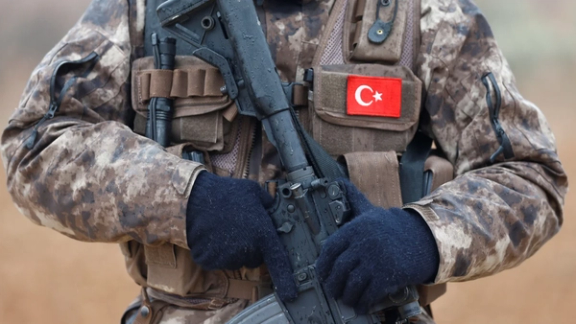Syria upheaval vaults Turkey into the ascendant, eclipsing Iran

The sudden downfall of Syria's Bashar Al-Assad has put his main backer Iran on the backfoot while giving Turkey the upper hand in a transformed Middle East.

The sudden downfall of Syria's Bashar Al-Assad has put his main backer Iran on the backfoot while giving Turkey the upper hand in a transformed Middle East.
But propping up a friendly government in battered Syria where Tehran failed will be a serious challenge for Ankara, which must also navigate the competing agendas of other heavyweights in the region.
"Turkey is many ways is a real winner here, but time will tell, and if Erdogan overplays his hand, he could mess things up because Israel and the United States won't let it happen," said Henri J. Barkey, a scholar of the Middle East at the US Council on Foreign Relations.
Turkey's President Recep Tayyip Erdogan, a Sunni Islamist, had long supported the armed rebellion against ousted the Iran-backed Syrian dictator Assad, even as the United States and Israel had largely acquiesced to his presence.
Hardline Sunni Islamist rebels capitalized on Shi'ite Islamic Republic's vulnerability in the region after 14 months of withering combat with Israel to wrest Damascus from Assad, whose losing fight against them Iran and its armed allies supported.
"There are complicated days ahead ... for the Syrians in their relationship with Turkey," said Patrick Clawson, a researcher at The Washington Institute.
"The Turks don't have the money to pay for what Syria needs. The Iranians weren't paying a whole lot, just barely keeping outside the line. That's one of the reasons why its forces fell apart".
The reaction of Washington, de facto leader of the NATO alliance in which Turkey has often been a rogue member for its independent stances, will be crucial.
US President-elect Donald Trump said on Monday that Turkey is the ultimate decider of what happens next in Syria, but spoke in harsh terms about its sudden rise there.
"Turkey did an unfriendly takeover without a lot of lives being lost," Trump told a press conference at his Florida residence in Mar-a-Lago.
"Right now, Syria has a lot of, you know, there's a lot of indefinites ... I think Turkey is going to hold the key to Syria,” he added.
“I think this must have come as a big surprise to the Turks because they were expecting that relations with the United States would improve with Trump winning the election, especially because Trump was known to have great admiration for Erdogan," Barkey of the Council on Foreign Relations said.
The Islamic Republic too appears to be casting a skeptical eye on Turkey's role.
Iran’s Supreme Leader Ayatollah Ali Khamenei accused the United States, Israel, and another unnamed country of plotting to overthrow Assad in a speech to his followers last week.
Khamenei was clearly referring to Turkey but dared not criticize it by name because Iran is no position to respond, said Karman Matin, an associate Professor of International Relations at Sussex University in the UK.
“We see a sense of desperation and impotence. The Khamenei speech, I think, was very telling, especially if you put it next to the previous speeches and you see the sense of what he wanted to have but couldn’t,” Matin told Iran International.
After Iran lost its grip in the region after punishing blows by Israel eliminating the top leadership, fighters and weapons stores of Tehran's militant allies, the Islamic Republic must now focus on another grim development: the return of Trump.
Matin described the mood among Iranian hardliners as a growing sense of desperation and feeling of betrayal by its Muslim neighbour in Ankara.
Ahmad Khatami, a senior hardline Iranian cleric, blamed Turkey for Assad’s demise and warned Erdogan that he will face consequences.
“Erdogan will pay the price for this betrayal against Muslims—one day, they [Muslims] will come for him,” said Khatami, a member of Iran's Assembly of Experts and Tehran Friday prayers leader said Tuesday.
While these hardliners also want revenge against Israel for its continued campaign to destabilize the Islamic Republic and its proxies, the Jewish state is also on edge with what will come of Syria’s future governance.
The fall of Assad and the Iranian sphere of influence in Syria is good news for Israel, but Matin described it as bittersweet.
“Israel's concern is probably more about Turkish expansionism now through Sunni rulers of Syria,” said Matin, "Turkey is now an issue for Israel."
As the new leaders in Syria solidify their rule, Matin argues that they won't be in a position to challenge Israel yet.
The ousting of Assad has created an opening for Turkey to now assert itself as a primary external factor, replacing Russia and Iran.
Hakan Fidan, the Turkish foreign minister, told Saudi al-Hadath TV on Sunday that Iran must better understand its actions following Assad’s downfall
“We don’t want Iranian domination, Turkish domination or Arab domination. It’s time for us to come together and establish our own interests, our own order in the region, shoulder to shoulder,” said Fidan.
Turkish spy chief Ibrahim Kalin was reportedly in Damascus last week for a meeting with rebel leaders and prayed in the city’s Umayyad Mosque which dates back to the dawn of Islam, according to Turkish media.
During the height of the Syrian civil war a decade ago, Erdogan took aim at Assad’s attacks on civilians, vowing to one day pray in the courtyard of that mosque.
He may soon be able to honor that pledge.